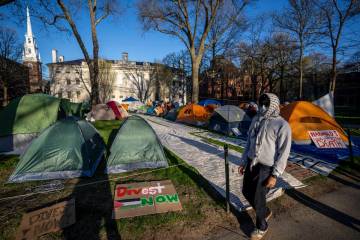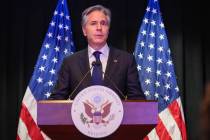County OKs deal’s cancellation
A doctor whose medical clinics have been linked to unsafe practices lost a $1 million contract with Clark County's hospital Tuesday, though some of the doctors in his practice still could work at the hospital.
Clark County commissioners backed University Medical Center's decision last week to cancel the contract for Dr. Dipak Desai after he had agreed on March 7 to quit practicing medicine while authorities investigate the Endoscopy Center of Southern Nevada.
Six patients contracted hepatitis C from the clinic, health officials have said, and 40,000 patients were urged to get tested for blood-borne diseases, including HIV. A new case of hepatitis C is being investigated at an affiliated facility on Burnham Avenue.
Only a few dozen gastroenterologists work in the area, and eliminating Desai's dozen or so doctors from the mix could hinder the hospital from meeting its needs, said Kathryn Silver, UMC's interim chief executive.
Plus, the doctors still have their licenses, Silver said.
"Until their licenses are revoked, they can practice at the hospital."
One commissioner bemoaned having any of Desai's doctors affiliated with the hospital.
"It's bothersome," Commissioner Chris Giunchigliani said.
Still, the hospital would "absolutely not" hire the principal partners in Desai's group, including Drs. Clifford Carrol and Vishvinder Sharma, UMC spokeswoman Cheryl Persinger said.
That would leave about 10 doctors to pick from, she said, adding that a medical committee will decide whether to bring in any of the doctors.
The University of Nevada School of Medicine is supplying doctors who, although not specialists, can do many of the procedures, Silver said.
A doctor receives $2,000 a day to tend the hospital's endoscopy services. Although that is cheaper than hiring a full-fledged practice, it's an unreliable method, Silver said.
If a doctor gets sick and cannot make it to work, there might be no one to fill in, she said. Also, on-call doctors are not required to focus on the hospital and may have several places they work during a shift.
"That's basically a Band-Aid," said Rick Plummer, a hospital spokesman, describing the on-call system.
The commission asked the hospital to explore hiring full-time doctors rather than contracting with a group. The hospital would need at least three doctors to handle the gastrointestinal work, Silver said, noting that each of them would cost $350,000 to $400,000 yearly.
Finding local specialists to step in will be tough because they are busy taking on the patients that Desai's group lost, Plummer said.
Given the limited supply, the hospital probably will recruit doctors outside the county and even the state, Plummer said.
The problem with a nationwide hunt is it will take months to screen doctors, and then they have to become licensed in Nevada, he said.
"It may be a year before they see their first patient," he said.
Desai seemed aware that his team was the hospital's best option at the time and took advantage of it, Plummer said.
In 2007, Desai scrapped his original contract, paying him $210,000 yearly, so he could push for a more lucrative one, Silver said.
The hospital was allowed to put the contract out to bid and received two applicants. One of them was Desai, and the other was Digestive Disease Specialists.
Desai wanted $1.85 million a year, and the other group asked for about $1.5 million, Silver said. But Desai's bigger team was better equipped to handle the hospital's volume, and negotiators talked him into accepting $990,000 a year, about half of his original asking price.
Desai said he needed the steep bump in pay to offset the higher-than-expected number of uninsured patients his doctors treated. Hospital officials thought his argument had merit.
Because UMC is a county hospital, it must take -- unlike private hospitals -- patients who have no means of paying for care, Silver said.
The hospital nixed Desai's contract, though the stricter oversight at hospitals would prevent anyone from reusing vials and syringes, Plummer said.
"If there are clinics in town potentially performing unsafe practices, we want nothing to do with them."




























